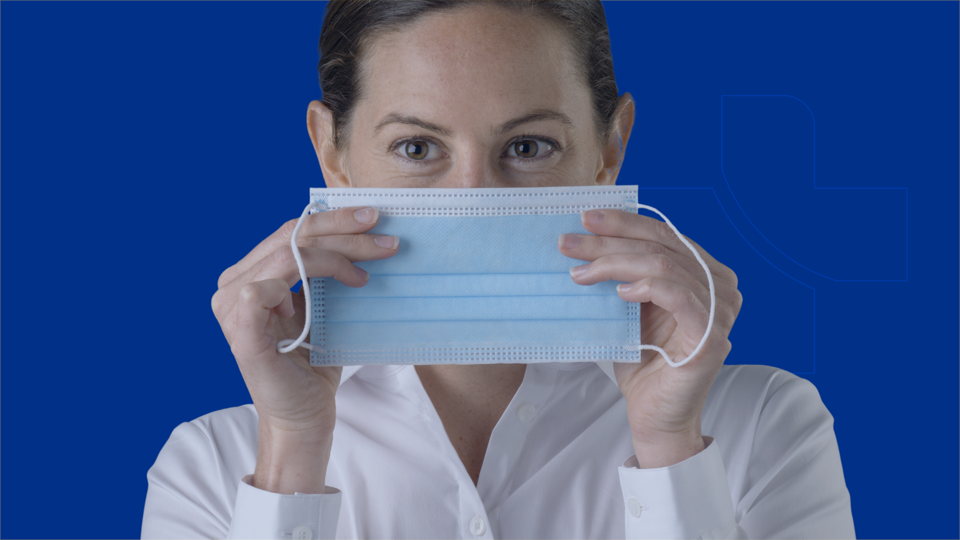During the height of the COVID-19 pandemic, single-use masks and respirators played a key role in protecting healthcare workers and the general public against the spread of the virus. Since then, masks have continued to provide protection in both medical and community settings against the transmission of infectious diseases. While most people understand that a medical mask or respirator can only provide protection when worn correctly, did you know that storing your face mask correctly is just as important?
Here is everything you need to know about how to wear and store single-use masks and respirators.

How do single-use face masks work?
Face masks such as medical masks and respirators protect wearers against airborne particles that can cause health issues including infectious disease and viral transmission. While different types of face masks provide differing levels of protection, it's essential to wear a face mask correctly to achieve the best protection. Both half face masks and respirators are designed to be worn over the nose, mouth, and chin.
Most medical and surgical face masks are made from several layers of fabric that are designed to filter out large particles from the air when the wearer breathes in and out.
In comparison, single-use Respirators offer a higher level of protection than face masks. Unlike medical masks, respirators are designed to sit flush against the face to create a tight seal around the edges. It is essential to achieve a good seal as this prevents any contaminated air from leaking around the mask. Respirator masks are intended to filter out hazardous particles from the air or, release into the air, making them an ideal choice not only in healthcare settings but also for those at high risk of serious illness anywhere else.
With that said, face masks and respirators can only provide the intended level of protection if they've been stored correctly, so here's how to take care of your masks.
How to store disposable masks and respirators before use
Storing face masks properly is essential to maintain their effectiveness and prevent contamination. Masks and respirators should be stored in accordance with the manufacturer's recommendations, which are detailed on the original packaging. This helps to protect the masks from damage, contamination, and dust, etc.


As a general rule you should:
- Store face masks in a clean dry place (<80% relative humidity) where they won't be crushed. Do not use if the packaging is damaged.
- Keep your face mask in the original packaging, as details such as the expiry date or date of manufacture are important to determine a use by date.
- Place your mask away from direct sunlight, excessive moisture, extreme temperatures, and hazardous chemicals (storage temperature should be between -20 C to +30 C).
- Ensure your face mask is readily accessible and convenient to you.
If you like to carry a mask with you while you are out and about, it is best to avoid storing your mask loose in your bag or pocket in between uses. Instead, store your mask in a paper bag, envelope or a packet that does not trap moisture. Sealable plastic bags are generally not recommended in between uses because they retain moisture, which can provide the perfect breeding ground for germs and bacteria.
How to store a used face mask
Disposable face masks, like surgical masks, medical masks and community face masks, are not intended for re-use. Single-use masks should be replaced with a clean one every 4 hours or when they become dirty, damaged, or damp. If you're not able to dispose of your used mask right away, you might have to keep the mask until you can find a bin. In this case, it can be a good idea to place your used mask into a resealable plastic bag to avoid potential contamination.
When it comes to removing a disposable mask, it's important to avoid touching the front of the face mask and your face. Remove the mask using the ear loops or headband. Fold the outside corners together and place your mask into a zip lock plastic bag. Be sure to wash your hands thoroughly with soap and water or a hand sanitiser before and after handling your mask. You can dispose of your face mask by putting it in the general waste bin. Don't be tempted to put masks into the household recycling bin, face masks are not recyclable at general waste plants.
What happens if the mask was not stored correctly?
Following proper mask storage guidelines means that your masks are more likely to remain clean, effective, and safe to use. This is especially important for medical face masks, which are designed to protect both the wearer and others from the transmission of infectious agents.
Storing a face mask incorrectly can pose a number of risks, including:
- Contamination: New masks that have not been stored correctly are likely to have become contaminated with dust, dirt, or other unwanted particles. This can reduce their effectiveness and increase the risk of infection when worn.
- Reduced effectiveness: Exposure to moisture, sunlight, and extreme temperatures can degrade the materials in masks, reducing their filtration efficiency.
- Damage: Incorrect storage can lead to physical damage to the mask, such as bending or tearing, which can render the mask unusable.
- Health risks: If a mask is stored improperly and becomes contaminated or damaged, using it may not provide the intended protection against respiratory infections. This can put the wearer and others at risk.
- Waste: Storing masks incorrectly can lead to the premature deterioration of masks, resulting in the need for more frequent replacement. This can be a waste of valuable resources, especially during times of mask shortages.
Do not forget to follow proper mask hygiene and any specific storage instructions provided by the mask manufacturer. If you are not sure about the condition of a stored mask, it is usually best to bin it and use a new, properly stored mask to ensure your safety and protection.
Detmold Medical mask and respirator storage recommendations


At Detmold Medical, we manufacture a range of personal protective equipment, including surgical masks and respirator masks for use in a variety of settings. We recommend storing all Detmold Medical masks in the original packaging, away from contaminated areas, dust, sunlight, extreme temperatures, excessive moisture, and damaging chemicals. When stored in line with our recommendations, most of our face masks are designed for use within 5 years from the date of manufacture. The exact details and date of manufacture can be found on the outer packaging. With that said, we always recommend using your face masks before their expiration date for the best protection.
Explore the range of Detmold Medical face masks or use our comparator tool to find the best mask for you.




